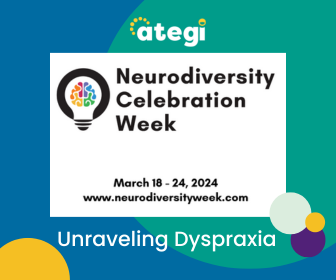Neurodiversity Celebration Week: Unraveling Dyspraxia
My name is Tess, I have been working with Ategi for the last 6 months and during Neurodiversity Celebration Week I would like to share a little bit about Dyspraxia; what it is, and what my experiences are having it...
What is Dyspraxia? Let's dig into it. Dyspraxia often gets mixed up with Dyslexia, probably because they sound alike and share some similarities. But what makes Dyspraxia different is it is a coordination disorder, or if we’re using the official term, it is a developmental co-ordination disorder (DCD). In short, Dyspraxia is a condition that affects physical coordination and motor skill balance. But it can also affect varying parts of one's life, from friendships, work and executing plans to undertaking everyday tasks. Dyspraxia isn't linked to intelligence, but experts say it can interfere with executive functions such as time management and short-term memory. It can even bring on depression and anxiety, especially when it is undiagnosed or misunderstood.
Dyspraxia is still an underrepresented and misunderstood disorder. Something I often hear is "Dyspraxia doesn't exist" or "It's super rare." But 6-10% of people are Dyspraxic. However, schools are still misunderstanding Dyspraxia. The Dyspraxia Foundation recently shared a blog about kids with Dyspraxia "falling under the radar." Parents call helplines, frustrated that their kids' needs are being brushed off as laziness or naughtiness. Teachers often lack the know-how to identify Dyspraxia and adjust their teaching. For children with Dyspraxia, it's a real challenge. Many kids with Dyspraxia are constantly being compared to classmates who aren't working half as hard to keep up.
When Dyspraxia is spoken about, it's often in the context of children, which is a shame because this disorder doesn't check out when people reach adulthood. Those of us with Dyspraxia, as an adult become pros at managing what were once struggles in childhood and have taken on various strategies, hobbies or adjustments that assist us through everyday activities. Here’s a bit about my experiences with Dyspraxia and how I have learned to love and celebrate it as a 30-year-old adult.
Like many who were or are neurodivergent children, I struggled in school. I dreaded P.E. I was always put into the bottom sets, forever wondering how people jumped over those big blocks in gymnastics. I’m still not sure how people do it. But even at a young age and without knowing I was Dyspraxic I knew there were some things I just couldn’t trust my body to do. But it wasn’t just P.E. I also found other subjects difficult, like English, Maths, History, Geography, Science, French, Welsh… just about everything other than Art. When I was in school Dyslexia was just about being understood. Children were being helped more than they ever had been before, but I still felt my struggles were never fully grasped. I often looked like I wasn’t listening. I’d constantly fidget or incessantly chew on a pen because it was the only way to have any hope of being able to concentrate when learning about osmosis or ratios. As I got older, I started to notice more, I was clumsy, I mean really clumsy, I couldn’t balance, I fell over constantly, and my knees to this day are covered in scars from grazes. I broke so much of my parents’ kitchenware that it became a regular joke. Then as I got older again, I had to manage my own time, this is something I still can’t quite master. I was late for everything, constantly running to get to college on time.
But after years of being a clumsy child and teenager in my late 20’s I began to love how hard I had to work to get what I wanted out of life; it made me so much more grateful when I achieved it and more motivated to push myself even harder. I never learned to ride a bike, I really did try but when you’re Dyspraxic riding a bike can be quite the challenge. But I was determined to learn to drive (another activity many of us with Dyspraxia struggle with) and it took years. But when I did finally pass my driving test, I took myself on a solo road trip from south to north Wales driving down some seriously dodgy roads. Then later that year I drove in Barcelona city and on some Spanish motorways. Today I understand myself in a way that I think many my age probably don’t. I have had years of being confused and frustrated by my brain and my body, but these days I love that it makes me who I am. From being a child who hated sports to being an adult who loves swimming and yoga. Neurodiversity isn’t about what an individual can’t do, it is about learning what we can do for ourselves and what others can do for us to make life more accessible. And if some things take a little longer or you must work a little harder, or if you fall over during the process, so what, life is messy, and it would be boring if it wasn’t.

I often looked like I wasn’t listening. I’d constantly fidget or incessantly chew on a pen because it was the only way to have any hope of being able to concentrate when learning about osmosis or ratios.









About the author
Tess Seymour
Tess is Ategi's Communications, Engagement Officer (Maternity Cover). Tess has several years of experience driving integrated multi-channel communications campaigns across the charity sector.
Tess is a values-driven professional, working within areas that reflect her core beliefs. Alongside her
third-sector work, she is also an avid documentary and commercial photographer.